
He takes to wandering in bazaars, singing or haranguing passers-by. He drifts into fantasies of becoming a robber and raping a woman. He begins to act strangely, beating in succession his daughter and his wife, and talking to a gecko. Sitaramrao's uncle turns down a request for a loan, replying that Sitaramrao's father had treated him poorly: it was he who built the family's wealth, which Sitaramrao's father had squandered, and in his view, the son was behaving as his father had. On waking, a feeling of irritation provokes him to think that unless life is easy, and lived effortlessly, it is better to die. As one side speaks, the other is veiled, but they both assure him that whatever he hungers after will be provided. One day he dreams of seeing an androgynous figure composed half by the goddess Parvati and half of Paramesvara. He is soon reduced to straightened circumstances, and forced to seek employment, but fails to hold any job. Though The village elder Ramayya cautions him to be careful with his wealth, Sitaramrao, inspired by lofty ideals, pays for a lavish funeral, and arranges for people with large debts to his family to repay only a small proportion. At the start of the novel, Sitaramrao's father on his deathbed commands his son to maintain the family's honour. He comes from a distinguished family, whose grandeur is celebrated.

The protagonist of the novel is Sitaramrao. Ramayya – an old man from Sitaramrao's village.



 0 kommentar(er)
0 kommentar(er)
